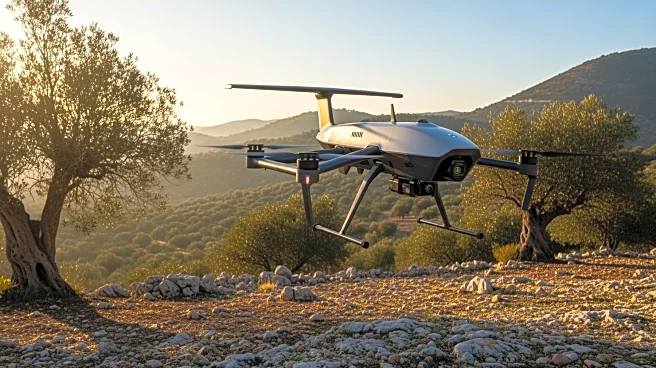What's Happening?
Greece conducted a comprehensive tactical exercise featuring domestically developed drones and counter-drone technologies, marking a significant step in NATO's push for faster battlefield innovation. The
exercise, held under the observation of military officers from the United States, France, Bulgaria, Armenia, and Turkey, showcased a variety of drones performing tasks such as dropping tire spikes, laying smoke screens, and delivering medical supplies. This initiative is part of Greece's broader military overhaul, driven by the need for autonomy and rapid production in response to geopolitical tensions, particularly with Turkey.
Why It's Important?
The exercise highlights a shift among mid-sized NATO economies towards indigenous drone technology, spurred by Russia's invasion of Ukraine. This move is crucial for enhancing deterrence capabilities and reducing reliance on imports. For Greece, drones are integral to a 25 billion euro military upgrade, reflecting the urgency of adapting to modern warfare dynamics. The initiative also underscores NATO's call for Europe to adopt a startup mentality in defense, fostering innovation and rapid development. This shift could redefine military procurement and operational strategies, impacting defense industries and geopolitical stability.
What's Next?
The success of Greece's drone exercise may encourage other NATO members to accelerate their own innovation efforts. As NATO leaders continue to advocate for rapid development ecosystems, European defense sectors might increasingly focus on agile, small-scale firms capable of quick adaptation. This could lead to a reevaluation of traditional procurement cycles and a push for more flexible, responsive military strategies. Additionally, the integration of advanced technologies in military exercises could spill over into civilian applications, enhancing disaster response capabilities.
Beyond the Headlines
The drive for faster innovation in military technology raises ethical and strategic questions about the future of warfare. As drones and autonomous systems become more prevalent, issues such as accountability, decision-making speed, and the role of human oversight in combat scenarios will need to be addressed. Furthermore, the shift towards rapid development may challenge existing military hierarchies and require significant cultural adjustments within armed forces.








